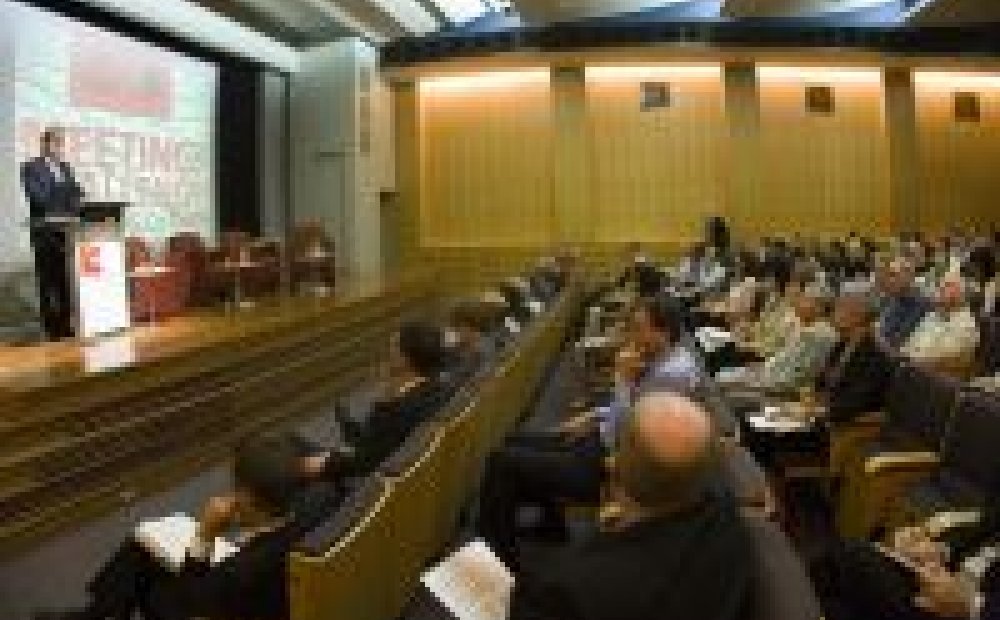Meeting the Challenge of Climate Change

The State Library of Victoria and the Woodrow Wilson International Center for Scholars co-sponsored a half-day conference titled "Meeting the Challenge of Climate Change" on March 27, 2007, in Melbourne, Australia. The event, held at the historic State Library, explored Australia's public- and private-sector efforts to address climate change, and placed these efforts in the context of broader regional and international action.John Thwaites, deputy premier of Victoria and minister for water, environment, and climate change, delivered the keynote address on Victoria's efforts and achievements in battling climate change. He called for greater leadership by government at the local, state, national, and international levels; and advocated using efficiency incentives to reduce demand while transitioning to less carbon-intensive energy sources. He also promoted "carbon pricing"—establishing a cost for carbon emissions—which would bring greater certainty to the regulatory environment so that businesses can make long-term, carbon-friendly investments. Further, he argued for a federal cap and trade system, which would limit total emissions and establish a marketplace to trade excess reductions. Thwaites indicated that Australia's states would pursue such a system if the national government in Canberra continued its perceived inaction.
Impacts of Climate ChangeJon Barnett, a geographer at the University of Melbourne, discussed environmental changes projected to arise from climate change, and the impacts of these changes on social systems in Australia, northern China's Yellow River, East Timor, and the Pacific Atoll countries (Kiribati, Marshall Islands, Tuvalu, and Tokelau). He provided an overview of several changes predicted by the Intergovernmental Panel on Climate Change, the premier scientific body examining climate change, including:
- Global mean surface temperature could increase by between 1.1 and 6.4° Celsius by the year 2100;
- Global mean sea level could rise by between 18 and 59 centimeters (this excludes the possibility of ice-sheet melting, which could raise sea levels more than 1 meter by the end of the century;
- A more vigorous global hydrological cycle could produce more intense climatic extremes such as heatwaves, droughts, and floods; and
- Cyclones could be more intense, last longer, exhibit higher wind speeds, and unleash more rainfall.
According to Barnett, the environmental consequences of these changes will vary from place to place—diminishing snow pack in Australia's alpine region, water shortages in northern China, soil erosion in East Timor's mountains, and loss of island reefs and shrinking coastlines. Climate changes also pose risks to social systems, but the impacts depend on how environmental resources are valued and used. For example, the Australian tourism industry values the Great Barrier Reef in a different way than the country's indigenous communities, so the two groups face different consequences from changes to it. Similarly, while drought in Australia kills cattle, in East Timor it kills people.
Australia at Risk
In Australia, coral reefs, alpine ecosystems, and wetlands are most at risk; dangers include coral bleaching, decreasing snow cover, and declining mean rainfall across southern Australia leading to lower water supply and more frequent and severe droughts and floods. Industries at risk include tourism, irrigated agriculture, and livestock. Australia's current drought—the worst in recorded history—provides a glimpse of predicted impacts on its urban and rural potable water supplies.
Ultimately, the net impacts of climate change on social systems depend on whether adaptation options exist, and, if they do, whether societies have the capacity and resources to implement such measures. If they have multiple options, societies must weigh the relative gains and losses. For example, the Great Barrier Reef's coral could be protected by reducing tourism or by stopping agricultural sediment and nutrients from flowing over the reef. But what are the economic, social, and political costs of these two strategies? Who will make the tough political choice between them, and how?
Mitigation and Adaptation
To lessen the anticipated impacts of climate change, Barnett called for a combination of mitigation and adaptation strategies. Speaking to Australia and other developed countries, he stressed that while all people and countries should reduce emissions, developed countries have a particular responsibility because not only can they more easily bear the costs of action, they historically account for a disproportionate share of emissions.Tony Wood, director for public and government affairs for Origin Energy—Australia's second largest energy company—said the challenge of climate change must be met by public- and private-sector action. He called for a clear regulatory framework to facilitate long-term investment decisions: "Government intervention is necessary, but [it] can and should be constrained." Anticipating charges on carbon emissions, Wood argued that Australia should institute a cap and trade system: "There are solid reasons for Australia to introduce a domestic emissions trading scheme while the international framework is still emerging."
Peter Christoff, professor at University of Melbourne and vice president of the Australian Conservation Foundation, pointed out that Australia has the highest per capita carbon emissions among OECD countries. Citing a 2006 study by the Australian Business Roundtable on Climate Change, he said, "It is affordable and achievable for Australia to have a clean and efficient economy." He also called for adaptation strategies that are flexible, environmentally effective, economically efficient, and inclusive and participatory. Additionally, he urged Australia to ratify the Kyoto Protocol and exhibit leadership in regional efforts such as the Asia-Pacific Partnership, as well as support cap and trade schemes at national and international levels.
Domestically, Christoff advocated targets for reducing emissions to 30 percent below 1990 levels by 2020 and to 80-90 percent below 1990 levels by 2050. He sees great potential for domestic regulation and planning laws to produce energy efficiency and new technology. Other instruments—carbon taxes, levies, and subsidies for mitigation and adaptation for disadvantaged communities—should be part of Australia's basket of efforts. Finally, he noted the importance of participation in the political decision-making process. The task of addressing climate change, he stressed, requires government action, but also engagement by the private sector, communities, and individuals.
Drafted by Geoff Dabelko.
Speakers
Former Chariman, Board of Trustees, Wilson Center

Professor and Associate Dean, George V. Voinovich School of Leadership and Public Affairs, Ohio University; Associate Senior Fellow, Environment of Peace Initiative, Stockholm International Peace Research Institute
Hosted By

Environmental Change and Security Program
The Environmental Change and Security Program (ECSP) explores the connections between environmental change, health, and population dynamics and their links to conflict, human insecurity, and foreign policy. Read more
